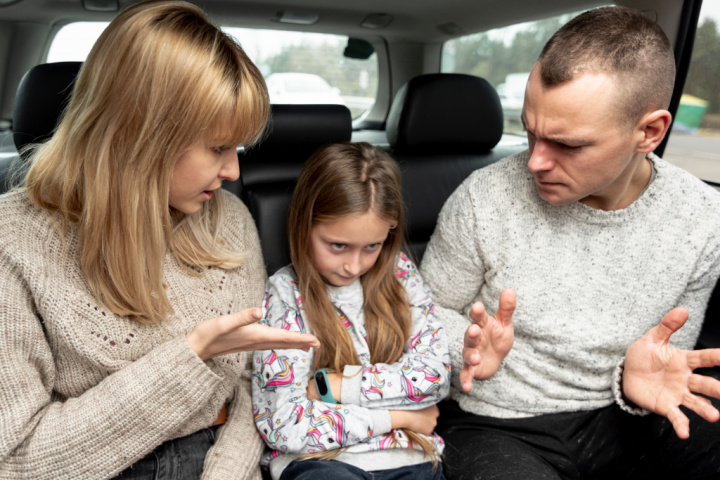What Is It Called When.your Family Is Possessive
Having a sense of autonomy and control is essential to our health and well-being ane . However, in the terminal ii decades, there has been a disturbing decrease in sense of control amongst higher students 2 . They believe their lives are controlled by forces outside of themselves. Having decision-making mothers or fathers is, at to the lowest degree in part, a prevalent source of such helplessness.
Types of Parental Control
In that location are two types of parental control – behavioral control and psychological control.
Behavioral Control
Behavioral control refers to supervising and managing children's beliefs. These parents subject field their kids' beliefs, monitor their whereabouts, and oversee their social life 3 . Behavioral command is intended to regulate children's behaviors to conform to the prevailing family or social norms.
Autonomy and regulation are both essential in a child's development. Autonomy allows a child to develop a divide identify away from their parents. This procedure of individuation is specially important during adolescence when teenagers are getting prepared for adulthood 4 .
At the same time, parents need to provide adequate construction for the child to larn to inhibit disruptive behavior and engage in socially acceptable behavior 5 . Structure and guidance in behavior are necessary to facilitate favorable personality evolution.
Behavioral command, to a sure extend, is paramount in a kid's good for you development. Information technology aims to monitor, teach and regulate appropriate behavior.
However, when parents go overboard and control every minute details of their children's behavior, they get controlling parents 6 .
Psychological control
Psychological control refers to intruding into children'southward emotional and psychological development. Decision-making parents are nonresponsive to their children's emotional and psychological needs. They constrain, invalidate, and manipulate the kids' psychological experience. They also stifle independent expression of emotions 7 .
These controlling parents manipulate children'south feelings, thoughts or ideas through the parent-child human relationship using guilt, dearest withdrawal, showing disappointment, disapproval and shaming 8 . In addition, they want to keep their kids emotionally dependent and enmeshed with them nine .
Psychologically decision-making parents are experienced by their children every bit being intrusive, overprotective, possessive, directive, and controlling through guilt x .

Ways of Controlling
Children can experience parental control differently depending on what measures decision-making parents use. Here are 2 orientations of decision-making exercise.
Internally Controlling
Psychological control is often exerted through subtle, non-verbal cues. These parents appeal primarily to forces and regulations that reside within the kid, such as when parents activate feelings of shame and guilt.
Because the control is more internal, covert and nonobvious, most psychological command measures are internally controlling parenting practices.
Externally Decision-making
Externally controlling parenting is done in an open up and overt fashion. Shouting, hit, punishing and rewarding are the common strategies used to coerce children with external contingencies.
Psychological control is non ever internally controlling. Some parents engage in personal attacks or erratic emotional behavior such as alternating between caring and attacking towards their children.
Harsh parenting, helicopter parenting and strict parenting are all externally controlling parenting types. All of these parenting styles are disciplinarian parenting styles.

Signs of Controlling Parents
Whether a parent is controlling depends on a combination of several factors eleven :
- type of control (behavioral vs psychological)
- way of control (internally decision-making vs externally controlling)
- level of control (moderate vs high)
- temperament of the child (does the child perceive them equally controlling)
Despite the complexities, at that place are some parenting practices that are considered controlling "on average".
Here are some common signs of controlling parents:
- Demand bullheaded obedience and conformity.
- Do not allow children to participate in or question the parents' decisions.
- Do not let their kid make their own decisions.
- Exercise non encourage choice or independence.
- Dictate every aspect of the kid'south life.
- "Assist" the child without existence asked.
- Use reasons such as "considering I said so" to bailiwick.
- Believe children should be seen, but not heard.
- Manipulate and exploit the parent–child bond, through such every bit guilt induction or love withdrawal.
- Discipline through punishment and coercion.
- Use negative, affect-laden expressions and criticisms, such equally disappointment and shame.
Psychological Furnishings of Controlling Parenting
Psychologists accept found that different controlling factors can cause different impacts in children, particularly adolescents.
Lack of behavioral control has long been associated with behavioral issues. These kids act out more and are less capable of inhibiting disruptive behavior.
Moderate amount of behavioral regulation and monitoring are good for children. Enforcing boundaries and monitoring are associated with positive outcomes such as less acting out and ameliorate bookish operation 12 .
Merely when the control is at a loftier level, the negative impact on children's development tin can exist long-lasting 7 whether it'due south behavioral or psychological. At loftier levels of behavioral or psychologically control, adolescents experience that they are incompetent and they don't matter half dozen .
Parents who are very behaviorally controlling undermine their children's conviction in their abilities. Excessive parental assistance during tasks and interrupting a child's trouble-solving communicate doubt regarding the kid's competencies. Equally a effect, these children suffer from lower self-esteem. They are less cocky-regulated, higher in acting out, and lower in academic achievement thirteen,14 .
Many psychologists believe that psychological control is peculiarly dissentious to a child. The insidiously manipulative tactics used past an internally controlling father or mother can induce feelings of undue loyalty towards parents to comply with their authority.
These children's compliance is driven by a desire to avert feeling guilty or losing the parents' honey eleven . So when they are rejected by the parents, they feel resentment. This mixture of ambiguous and conflicting feelings towards parents creates a sense of inner tension. Children of psychologically controlling parents are more prone to suffer from low self-esteem, and mental health problems, such as anxiety, depression 15 , and antisocial behavior 16 .
On the other paw, externally controlling parents have dissimilar impacts on their children. Kids model their behavior after their parents' behavior. Externally controlled children oftentimes witness their parents engaging in overt aggressive and decision-making behaviors. They are more prone to physical assailment towards others 17 . They are more probable to become bullies or victims of bullying. They also tend to pass this type of harsh parenting to the next generation 18 .

How To Deal With Controlling Parents
"Why are my parents trying to control my life?"
If y'all're an unfortunate kid who has controlling parents, I empathize.
It is hard for children or teenagers to deal with controlling parenting on their own because they are completely relying on their parents. Asking for counselling at school or requesting to run across a therapist can provide the support to go through this.
Some kids also utilise negotiation as a more autonomous way of coping 19 .
If you lot were or accept been a controlling parent, the best affair to do for your kid is to seek professional assistance for yourself. Children normally use one of two non-autonomous ways of coping – compulsive compliance and oppositional defiance. Neither one is proficient for your kid.
If you're a grownup, having a decision-making parent can make you feel disrespected 16 . Unfortunately, research shows that decision-making parenting behavior is unlikely to change over time twenty . If you endure from depressive or anxiety symptoms, seek professional help equally presently as possible. When looking for therapeutic help, wait for 1 who is good in relational therapy 21 and in dealing with controlling parent issues.
References
-
1.
Dreher D, Feldman D, Numan R. Controlling Parents Survey. College Student Affairs Journal. 2014;32(one):97-111.
-
2.
Twenge JM, Zhang L, Im C. Information technology'south Beyond My Control: A Cross-Temporal Meta-Assay of Increasing Externality in Locus of Control, 1960-2002. Pers Soc Psychol Rev. Published online Baronial 2004:308-319. doi:10.1207/s15327957pspr0803_5
-
3.
Ballash N, Leyfer O, Buckley AF, Woodruff-Borden J. Parental Control in the Etiology of Anxiety. Clin Child Fam Psychol Rev. Published online November 7, 2006:113-133. doi:10.1007/s10567-006-0007-z
-
4.
Marcia JE. Identity in adolescence. Handbook of adolescent psychology. 1980;nine(11).
-
5.
Lamborn SD, Mounts NS, Steinberg L, Dornbusch SM. Patterns of Competence and Aligning among Adolescents from Authoritative, Disciplinarian, Indulgent, and Neglectful Families. Child Development. Published online Oct 1991:1049. doi:10.2307/1131151
-
6.
Kakihara F, Tilton-Weaver L. Adolescents' Interpretations of Parental Control: Differentiated past Domain and Types of Command. Child Development. Published online November 2009:1722-1738. doi:10.1111/j.1467-8624.2009.01364.10
-
seven.
Barber BK. Parental Psychological Control: Revisiting a Neglected Construct. Kid Development. Published online December 1996:3296. doi:x.2307/1131780
-
8.
Barber BK, Harmon EL. Violating the self: Parental psychological control of children and adolescents. In: Intrusive Parenting: How Psychological Control Affects Children and Adolescents. American Psychological Clan; 2002:xv-52. doi:10.1037/10422-002
-
9.
Pettit G, Laird R, Dodge Thou, Bates J, Criss M. Antecedents and behavior-problem outcomes of parental monitoring and psychological command in early adolescence. Child Dev. 2001;72(2):583-598. doi:10.1111/1467-8624.00298
-
10.
Schaefer ES. A configurational assay of children's reports of parent beliefs. Journal of Consulting Psychology. Published online 1965:552-557. doi:10.1037/h0022702
-
11.
Soenens B, Vansteenkiste M. A theoretical upgrade of the concept of parental psychological control: Proposing new insights on the basis of cocky-conclusion theory. Developmental Review. Published online March 2010:74-99. doi:ten.1016/j.dr.2009.11.001
-
12.
Edible bean RA, Bush KR, McKenry PC, Wilson SM. The Impact of Parental Support, Behavioral Control, and Psychological Control on the Bookish Achievement and Self-Esteem of African American and European American Adolescents. Periodical of Adolescent Research. Published online September 2003:523-541. doi:ten.1177/0743558403255070
-
13.
Grolnick WS, Ryan RM. Parent styles associated with children's self-regulation and competence in schoolhouse. Journal of Educational Psychology. Published online 1989:143-154. doi:10.1037/0022-0663.81.2.143
-
14.
Ginsburg GS, Bronstein P. Family Factors Related to Children's Intrinsic/Extrinsic Motivational Orientation and Academic Performance. Child Development. Published online Oct 1993:1461. doi:ten.2307/1131546
-
fifteen.
McClure EB, Brennan PA, Hammen C, Le Brocque RM. Journal of Abnormal Child Psychology. Published online 2001:1-ten. doi:x.1023/a:1005260311313
-
xvi.
Barber BK, Xia M, Olsen JA, McNeely CA, Bose K. Feeling disrespected past parents: Refining the measurement and agreement of psychological command. Journal of Adolescence. Published online April 2012:273-287. doi:10.1016/j.boyhood.2011.x.010
-
17.
Joussemet G, Vitaro F, Barker ED, et al. Decision-making Parenting and Physical Aggression During Unproblematic School. Child Development. Published online March 2008:411-425. doi:x.1111/j.1467-8624.2007.01133.x
-
xviii.
Simons RL, Whitbeck LB, Conger RD, Wu C. Intergenerational transmission of harsh parenting. Developmental Psychology. Published online 1991:159-171. doi:10.1037/0012-1649.27.1.159
-
nineteen.
Kuczynski 50, Kochanska G. Development of children's noncompliance strategies from toddlerhood to historic period five. Developmental Psychology. Published online 1990:398-408. doi:10.1037/0012-1649.26.three.398
-
20.
Hairdresser BK, Maughan SL, Olsen JA. Patterns of Parenting across Adolescence. New Directions for Child and Adolescent Evolution. 2005;108:5-16.
-
21.
Jordan JV. A Relational Approach to Psychotherapy. Women & Therapy. Published online June 13, 1995:51-61. doi:10.1300/j015v16n04_05
Source: https://www.parentingforbrain.com/controlling-parents/
Post a Comment for "What Is It Called When.your Family Is Possessive"